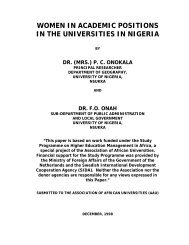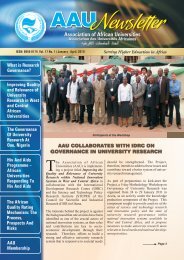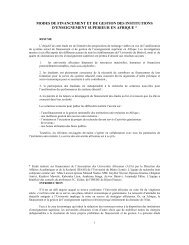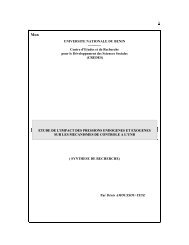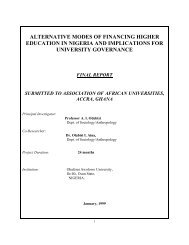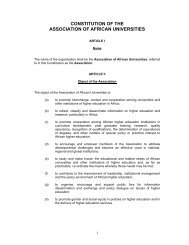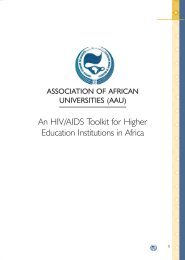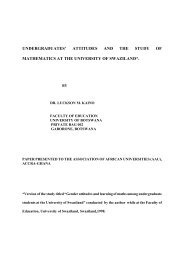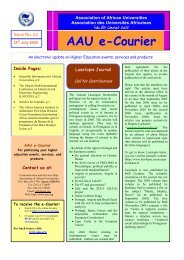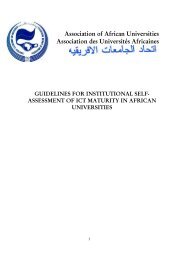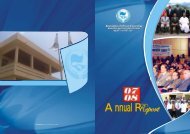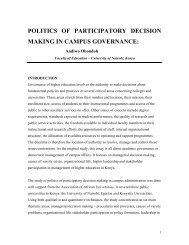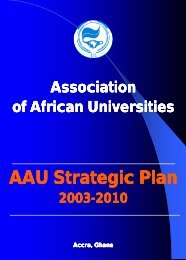governing teacher education colleges in south africa
governing teacher education colleges in south africa
governing teacher education colleges in south africa
Create successful ePaper yourself
Turn your PDF publications into a flip-book with our unique Google optimized e-Paper software.
21<br />
may work, demand autonomy <strong>in</strong> their work, have divided loyalties (to their peers, to their<br />
organisation, etc.,), and demand peer evaluation of their work. 36 In this sense, <strong>colleges</strong> of<br />
<strong>education</strong> as <strong>in</strong>stitutions of higher <strong>education</strong> comparable to universities will become<br />
professionalised organisations <strong>in</strong> which employees will demand a large measure of control<br />
over <strong>in</strong>stitutional decision mak<strong>in</strong>g processes.<br />
6. State, social responsibility and <strong>in</strong>stitutional autonomy<br />
There are three major areas of tension <strong>in</strong> the structures and processes of college<br />
governance. The first is between the role of the national/prov<strong>in</strong>cial government vis-à-vis the<br />
college adm<strong>in</strong>istration. Throughout the history, <strong>teacher</strong> <strong>education</strong> has been a prov<strong>in</strong>cial<br />
matter. The relationship between national and prov<strong>in</strong>cial government has been<br />
characterised by almost total devolution of control from national to prov<strong>in</strong>cial government.<br />
However, with the new political dispensation, the uncerta<strong>in</strong>ty about the division of<br />
responsibilities between the two levels of government, has resulted <strong>in</strong> serious disputes<br />
about 'who should decide about what's <strong>in</strong> this area.’ In the process, <strong>colleges</strong> of <strong>education</strong><br />
have been under bureaucratic control of prov<strong>in</strong>cial <strong>education</strong> departments. With few<br />
exceptions, they were run almost as extensions of these departments.<br />
The second area concerns the role of the college council vis-à-vis the role of <strong>in</strong>stitutional<br />
adm<strong>in</strong>istration. Another important area is the role of the college rector as ‘chief-executive’<br />
and his/her staff and the role of the faculty <strong>in</strong> <strong>in</strong>stitutional governance. In higher <strong>education</strong>,<br />
throughout the world, the system of governance is a delicate balance among government,<br />
the adm<strong>in</strong>istration, the faculty, staff, and the students. It is of utmost importance that each<br />
part of this balance understands its role and especially its limitations. Councils have legal<br />
responsibility for the <strong>in</strong>stitution and are responsible for its general policy to the public for<br />
whom the <strong>in</strong>stitution exists. Nearly all this power, especially as it applies to the <strong>education</strong>al<br />
processes of the <strong>in</strong>stitution, is delegated to the rector’s office and then distributed to the<br />
different levels of decision mak<strong>in</strong>g <strong>in</strong> the <strong>in</strong>stitution. This system of governance breaks<br />
down when any significant segment of the system seriously misconceives its role.<br />
Although, autonomy, very often referred to as “room to manoeuvre” or “go<strong>in</strong>g your own way”,<br />
is a constitutional right <strong>in</strong> higher <strong>education</strong> <strong>in</strong> South Africa, respondents are divided <strong>in</strong> their<br />
approaches to <strong>in</strong>stitutional autonomy. There are those who advocate local control with<br />
powers devolved to local council and senate. Protagonists of local control, represented<br />
<strong>colleges</strong> and universities - where the power hierarchy is diluted by the organization of knowledge (Amitai<br />
Etzioni, "Adm<strong>in</strong>istrative and professional authority", <strong>in</strong> Marv<strong>in</strong> W Peterson, op cit, pp.28-35.<br />
36 J Victor Baldridge et al, "Alternative models of governance <strong>in</strong> higher <strong>education</strong>", <strong>in</strong> Marv<strong>in</strong> E<br />
Peterson (ed.), ASHE Reader on Organization and Governance <strong>in</strong> Higher Education (Massachusetts:<br />
G<strong>in</strong>n Press, 1986), 3rd Ed., p.13. See also Karl E. Weick, "Educational organizations as loosely coupled<br />
systems", Ibid.<br />
21



